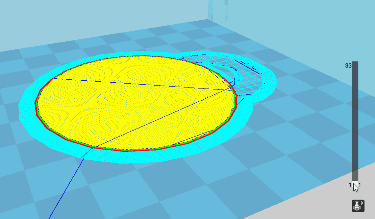Slicing 3D Print Files: Difference between revisions
From TSAS Library
JStallings (talk | contribs) No edit summary |
JStallings (talk | contribs) No edit summary |
||
| Line 7: | Line 7: | ||
# Go to "File," select "Open Profile," then locate the settings file you downloaded | # Go to "File," select "Open Profile," then locate the settings file you downloaded | ||
# Layer height should be .26 | # Layer height should be .26 | ||
# Shell thickness is always set to multiples of the nozzle size (.4 mm in this case), so reduce to .8mm | # Shell thickness is always set to multiples of the nozzle size (.4 mm in this case), so reduce from 1.2mm to .8mm | ||
# Reduce fill density to 10% | # Reduce fill density to 10% | ||
# Support type should be "Everywhere" | # Support type should be "Everywhere." This support will hold up any part that doesn't start on the bed. In the case of your name tags, it is the torus | ||
# Platform adhesion type should say "Brim" | # Platform adhesion type should say "Brim" | ||
# Click your model, then play with the three tools on the bottom. The middle one scales the model | # Click your model, then play with the three tools on the bottom. The middle one scales the model | ||
Revision as of 20:51, 24 April 2017
You have found or created a 3D model and saved it as an .stl file. The next step is to slice the file into layers that the 3D printer will follow when creating your object.
- and install or open Cura
 . We must use an older edition at the school
. We must use an older edition at the school - On first install, you'll need to set up the machine. Choose PrintrBot, then Play when prompted
- Download settings file here. (It is safe; I made it)
- Go to "File," select "Open Profile," then locate the settings file you downloaded
- Layer height should be .26
- Shell thickness is always set to multiples of the nozzle size (.4 mm in this case), so reduce from 1.2mm to .8mm
- Reduce fill density to 10%
- Support type should be "Everywhere." This support will hold up any part that doesn't start on the bed. In the case of your name tags, it is the torus
- Platform adhesion type should say "Brim"
- Click your model, then play with the three tools on the bottom. The middle one scales the model
- Pay attention to the time it will take to print your model; 30 minutes is fine. If it takes much longer, scale the file down. If it is really short, scale it up
- With the model selected, click View Mode in the top right, and choose Layer
- This shows the layers created by the slicer. Can you read the letters? If not, scale up your badge. If you scale it to the max and still can't read it, rebuild the badge with larger text
- Press the save button on the middle top, and name your file with your name, a description, and the color you want, e.g. paul badge black.gcode
Next up: Using OctoPrint
